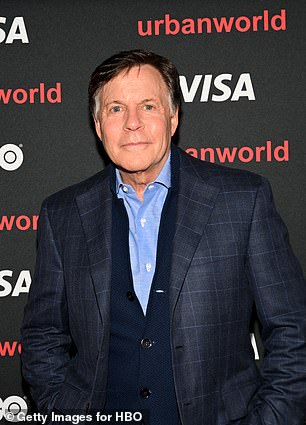OJ Simpson’s former NBC co-host Bob Costas revealed the “awkward” joke the accused murderer made during a 1994 jailhouse visit before his infamous trial for the murders of Nicole Brown and Ronald Goldman.
appearing in NBC Today Show On Friday, a day after Simpson died of cancer, Costas recalled visiting his old colleague in a Los Angeles jail, where the two were separated by a pane of glass.
Costas had a bandaged cut on his hand at the time of the visit, which caught the retired running back’s attention as the two men greeted each other by pressing their palms against the glass partition.
‘When I put [my hand] Up there, and he saw the bandage and a little drop of blood, he said, “Wait a minute, wait a minute.” You did it,’ Costas said, remembering his surprise.
‘I just thought at the time, it was an attempt at an awkward situation to lighten the mood, if that was possible. I didn’t read anything more than that, but it was a little strange.
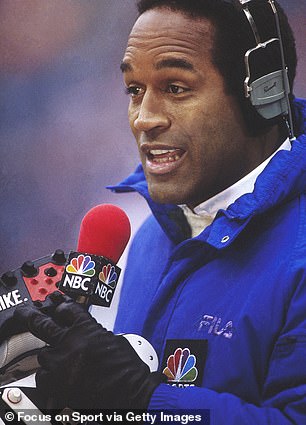
Bob Costas (left) and OJ Simpson (right) were longtime NBC Sports colleagues before 1994.
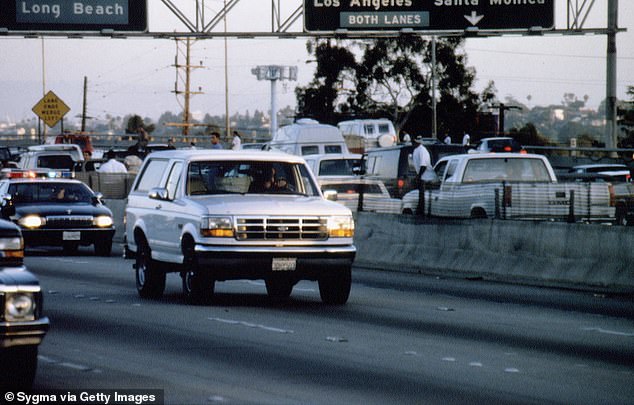
As much of America prepared to watch Game 5 of the 1994 NBA Finals, OJ was running.
Of course, Costas wasn’t the only one who suffered a cut on his hand. Investigators noted several cuts on Simpson’s arms and hands during their examination; injuries the Hall of Famer claimed he suffered from breaking a glass when he learned Brown had been murdered.
Costas’ story was part of a moving segment with the famed host, who described Simpson as “good company” while making it clear that he thought his former colleague was guilty of killing Brown and Goldman.
“What I’m about to say doesn’t mitigate the crime he obviously committed,” Costas said.
“It’s a complicated legacy, to put it mildly,” Costas said. ‘I can’t think of anyone historical or anyone we might have known where the first chapter and the second chapter of their lives are such a stark contrast.
‘Yes, I knew him well. All of us at NBC Sports and across NBC who interacted with him really liked him.
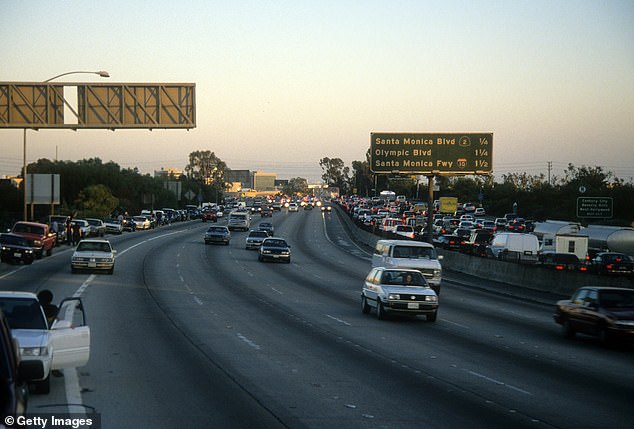
Police pursue the Ford Bronco driven by Al Cowlings and carrying OJ Simpson in June 1994.
Costas, 72, spent years working alongside Simpson on NBC’s NFL coverage, only to end up announcing the LAPD’s infamous car chase with the accused murderer on July 17, 1994. That chase ended with Simpson being arrested, charged with double homicide and ultimately acquitted in the “trial of the century” before he was found responsible for the deaths of his ex-wife and her friend in a civil trial in 1996.
He was a healthy and very well-known guy. And then all that, in our perception and in public perception, changed one night in June 1994,’ Costas added.
Of course, the deaths of Brown and Goldman were not the first troubling signs surrounding Simpson, who would later serve prison time in Nevada for an armed robbery.
Brown claimed in 1989 that police visited the couple’s home eight times for domestic violence, and even if Costas was unaware of each case, Simpson ultimately pleaded no contest to spousal abuse that same year.
In 1992, Brown filed for divorce, although Simpson continued to work for NBC Sports until 1994, when the infamous police chase unfolded on the Los Angeles freeways.
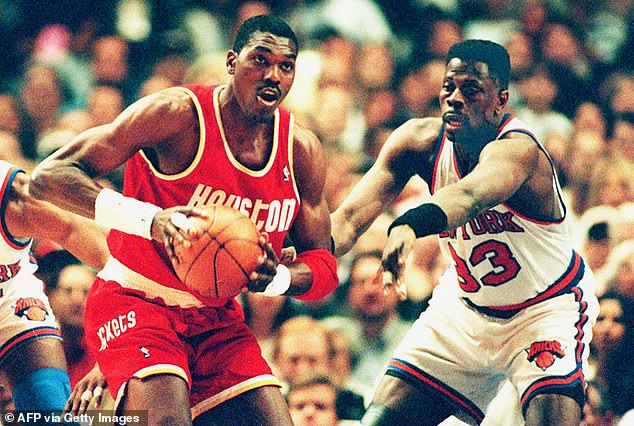
Costas guided viewers between OJ’s chase and Game 5 of the 1994 NBA Finals.
As any American of a certain age can remember, the chase took place during Game 5 of the NBA Finals between the Houston Rockets and the New York Knicks, meaning Costas had to guide the audience between Marv Albert’s call from Madison Square Garden and the description of journalist Tom Brokaw. of the persecution.
“NBC was in a unique position,” Costas recalled. ‘Every other network, every cable entity went on and ran it for hours and hours. But we didn’t just have a basketball game, an NBA Finals game, featuring the number one market in the country, not coincidentally, the New York Nicks against the Houston Rockets.
‘All that night, Marv Albert was calling the game. Sometimes he would throw it at me. He would then transition with Tom Brokaw, who was on 30 Rock. He would sum up the situation, which he called Shakespearean tragedy, and it certainly fit that description.
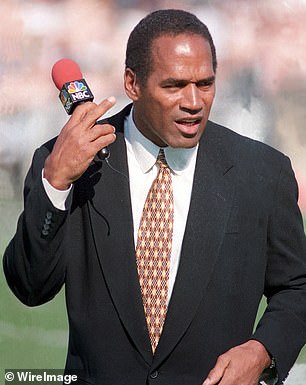
Simpson worked as a studio analyst and sideline reporter for NBC’s NFL coverage.
And then I would send it to Marv Albert. And other times, we split the screen, so [Knicks center Patrick] ewing and [Rockets center Hakeem] Olajuwon would do it at Madison Square Garden and the Bronco would slowly roll down the 405 on the other side of the screen. It was surreal, to put it mildly.
As Costas later discovered (and previously revealed), Simpson was trying to play everything in the studio during the infamous chase.
The two discussed Simpson’s attempt to contact Costas during the aforementioned jail visit.
“I asked OJ, ‘What made you think at that moment that you would want to talk to me?’ Costas remembered it. “And he said: ‘The media was defaming me,’ not so much because of the accusations, which were then fresh about the accusations of the crime, but because his general character and the life he had led were being defamed.
And somehow he thought that someone who was his friend, as well as his colleague, could perhaps, in fact, act as a character witness.
“And what I didn’t bother telling him, since it was a moot point, was that if he had contacted me and agreed to go on air, then I would have had to ask him some very pointed questions.
Costas, like fellow broadcaster Al Michaels, went from being Simpson’s friend and co-worker to eventually believing he was guilty.
“I kept telling myself the same thing,” Michaels wrote in 2014. “How can anyone think I did this?” No, ‘I didn’t do it.’ In hindsight, that should have been a clear sign to me that something wasn’t right.”


